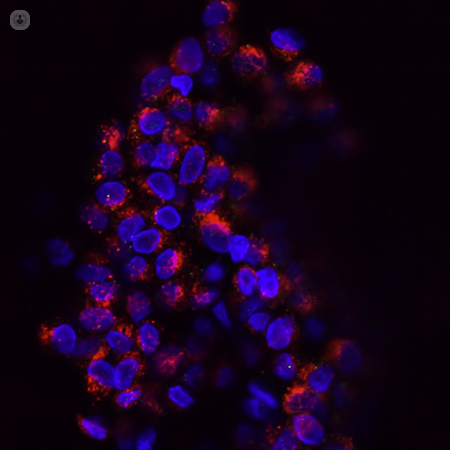Systemic anti-cancer therapy: An expert guide
Escrito por:At the forefront of cancer therapy, systemic anti-cancer treatment (SACT) is offering improved outcomes and fewer side effects for patients. In this informative article, highly respected consultant medical oncologist Professor Andrew Wardley shares his expert insight on systemic anti-cancer therapy, what it involves and how it relates to treatment of breast cancer.

What is systemic anti-cancer therapy?
Systemic anti-cancer therapy (SACT) is a term that has replaced ‘chemotherapy’ as many new treatments have considerably fewer side-effects and better efficacy. They target and destroy cancer cells throughout the body. SACT includes chemotherapy, hormonal therapy, immunotherapy, and targeted therapies.
When is systemic anti-cancer therapy indicated, and how is it given?
Systemic anti-cancer therapy is indicated for patients with cancer that has spread beyond the primary site, or for those at high risk of the cancer returning after surgery or radiation therapy. Most cancers require some form of SACT. It may be given as tablets, injections or intravenous infusion.
How does SACT work? How is SACT used to treat breast cancer treatment?
Systemic anti-cancer therapy works by killing and inhibiting the growth and spread of cancer cells. Chemotherapy, for example, uses drugs that target rapidly dividing cells, which cancer cells are. Understanding cancer biology has helped us to develop treatments that target cancers according to the cancer’s biology. Treatments are tailored to the individuals’ cancer; precision medicine allowing personalised medicine.
The main treatments for breast cancer include:
- hormonal therapy blocking the oestrogen that fuels the growth of certain types of cancer
- targeted therapies that target the key drivers of growth such as HER-2
- CDK4/6 inhibitors targeting the cell mechanisms for cancer growth
- immunotherapy which helps the body's immune system recognise and attack cancer cells
What are the side effects of systemic anti-cancer therapy?
The side effects of systemic anti-cancer therapy can vary depending on the type of treatment and the individual patient. Common side effects include fatigue, nausea, hair loss, and an increased risk of infection. Hormonal therapy can also cause hot flashes, night sweats, and vaginal dryness. Targeted therapy can cause skin rashes, diarrhoea, and changes in liver function. Immunotherapy can cause inflammation in various parts of the body, such as the lungs, liver, and gut.
It is important to discuss any side effects with your healthcare provider and to report any severe or persistent side effects as soon as possible.
If you are seeking treatment for breast cancer and wish to schedule a consultation with Professor Wardley, you can do so by visiting his Top Doctors profile.


